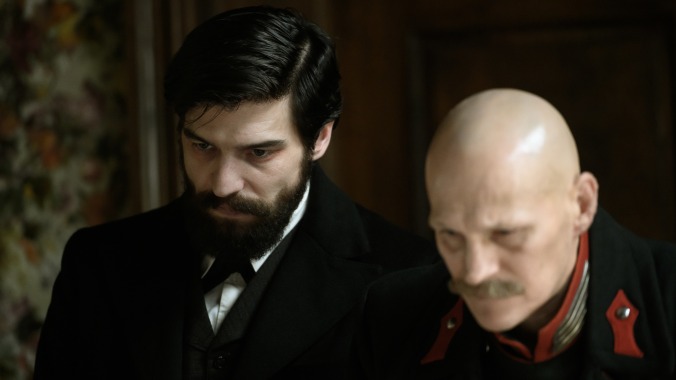Such a wild departure from a more traditional biopic series might actually be appreciated if Freud didn’t treat the cocaine-loving, free association-developing doctor as a mere bystander in all the murder and mayhem. The famed psychoanalyst’s name ends up being little more than branding—the season-long story about occultism and political unrest mostly unfolds without his participation. This isn’t the first time Freud has been reimagined as a sleuth: Jed Rubenfeld’s 2006 novel The Interpretation Of Murder saw Sigmund sniff out a killer while on his first trip to the United States; Freud even met up with Sherlock Holmes himself in the 1970s’ play-turned-movie The Seven-Per-Cent Solution. In real life, Freud was an avid reader of Sir Arthur Conan Doyle, according to accounts from a former patient. It’s not hard to see what inspired Kren et al. to place the doctor in a tale of psychic mediums and seemingly sexually motivated crimes, to make him out to be a kind of proto-profiler.
But the character never rises to that occasion; indeed, he struggles to be competent in his actual profession. When Freud begins, the doctor is prepping his maid Lenore (Brigitte Kren) to help him fake a successful hypnosis session for his medical school colleagues. He’s been staking his reputation on the notion that the human mind is distinct from the human brain, therefore not all treatment should be physiological. The real-life Freud was eventually proven right (though, again, his theories hold little standing in the current landscape), but in the series, he’s routinely and roundly mocked by his teachers and peers. Freud has even less of a feel for detective work, yet he still finds himself drawn into a plot to overthrow the government, unraveling the trauma of a former soldier (Georg Friedrich as Inspector Alfred Kiss), and the sordid family drama of the Hungarian Szapárys and their ward, Fleur Salomé (Ella Rumpf).
Murder mysteries and pulp novels are full of ordinary men caught up in extraordinary circumstances. But Sigmund Freud is an odd choice for an everyman, which is the characterization that Freud adheres to, even as Brunner and Kren’s writing plants seeds of the theories that would make Freud an intellectual giant. Finster looks the part of a handsome detective at the turn of a previous century; his hawkish face is made for brooding, his lush beard perfect for stroking absently while murmuring insightfully to himself. But any charisma he emits gets lost as Freud gets lost in the ever-expanding story. Occasionally, the show digs into his background through Shabbat dinners with his family and the stray anti-semitic remark from members of the Austrian bourgeoisie. We also get sporadic looks at his courtship of his future wife Martha Bernays, but Freud is more interested in a fictional romance between Sigmund and Fleur.
This brings us to the most obvious question when revisiting a historical figure’s strapping youth, especially one who was so preoccupied with the libido, in a would-be prestige drama: Does young Freud fuck? The answer is, only by accident. You can’t really hold that against him, though, because that’s how what little sex there is on the show occurs. People are suddenly naked—on one occasion, a whole throng of imperial soldiers stands with their dicks out, covered in blood and wearing animal heads—then being straddled, usually by Fleur. The result is unintentionally silly, as Freud never fully gives in to the desire to be an Austrian Penny Dreadful, even though Vanessa Ives’ influence on Fleur is undeniable. The Netflix series plots courses to procedural, sexy revisionist history, and supernatural drama territory, but never settles on a route. You might say that Freud suffers from, to borrow a term coined more recently than “death drive,” a fear of commitment.
All of these elements have their respective appeal, but they become an incoherent mess when combined together in Freud. The season midpoint does little to clarify the medical cases from the murder mysteries and political intrigue, and confusion reigns over the ending. Even the question of Freud’s capabilities as a psychiatrist/psychoanalyst remains unresolved. You could argue that the series offers subtle commentary on the elevation of mediocre men to mythical status, but sometimes, a poorly executed vision is just a poorly executed vision.










































